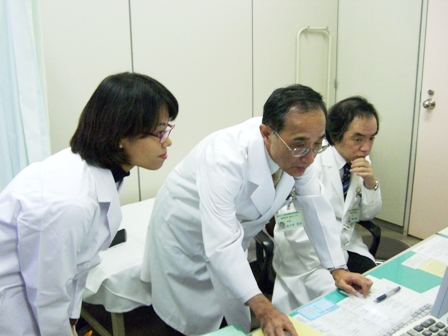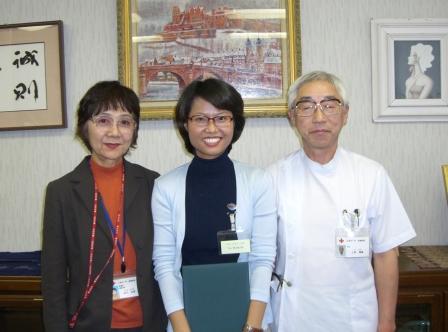Over the Years
Home > Over the Years > Over the Fiscal Years (2000 APR - 2010 MAR) > A Nurse from Korea Invited for Training
A Nurse from Korea Invited for Training
We accepted a nurse from the Yeungnam University Medical Center, Korea and provided a two-week training course.
Name and Title of Trainee:
Myoung-Suk Cho, Nurse
Department of Radio-Oncology
Yeungnam University Medical Center
Period of Training:
December 3 to December 14, 2007
Training Organizations (in order of visits):
Hiroshima University Hospital
Radiation Effects Research Foundation
Hiroshima A-bomb Casualty Council
Hiroshima Red Cross Hospital & Atomic-bomb Survivors Hospital
Hiroshima Peace Memorial Museum and other institutions
Training Course:
Nursing

At the Hiroshima A-bomb Casualty Council
Dr. Cho (left), Dr. Sasaki, Director of the Health Management & Promotion Center (center)

At the Hiroshima Red Cross Hospital & Atomic-bomb Survivors Hospital
Ms. Tagawa, Director of Nursing (left), Dr. Cho (center), Director Dohy, President of HICARE (right)
Comments:
The two-week training course that I received was well-balanced, with a focus on practical operations. It comprised: theoretical education including acquisition of knowledge and information; on-site study including tours to historical ruins; and technology acquisition and comparative analyses of advanced medical treatment. The training was so interesting and fruitful that I certainly want to recommend it to those involved in medical treatment related to radiation.
In particular, I was deeply impressed by the hands-on experience at the Hiroshima Peace Memorial Museum, which vividly demonstrated the truth of the past of Hiroshima, the target of the A-bomb. Moreover, seeing tens of thousands of folded cranes and water offered in front of the Memorial Cenotaph for the A- Bomb Victims and other cenotaphs, I was able to understand the role of people in Hiroshima, who had to preserve and hand down the tragic fact to posterity on the basis of the past experience.
"The anguish of those who survived after being caught in the atomic bombing is that of envying the dead."
Their role was to pray for the abolition of nuclear weapons to achieve a lasting global peace and to never repeat the mistakes of the past.
In strong agreement with them, we have to play a leading role in abolishing nuclear weapons, making people wary of the threat of atomic bombs.
At the Radiation Effects Research Foundation, researchers gave interesting and fruitful lectures on the basic knowledge of radiation effects on humans, epidemiological study, radiobiology, immunology and gene examination, in accordance with my level of knowledge. At the Hiroshima A-bomb Casualty Council, the director of the Foundation introduced me to all of its medical examinations and inspection equipment. At the Department of Radiation Oncology of the Hiroshima University Hospital, I was allowed to observe the latest treatment, about which I was kindly given an explanation by doctors and nurses, despite them being busy at work. At the Hiroshima Red Cross Hospital & Atomic-bomb Survivors Hospital, I received an explanation of basic nursing care using cutting-edge medical devices and took a tour of individual hospital wards including the intensive-care unit and the clean room. I would like to convey my most sincere thanks to the many people who arranged my training schedule. The training time was highly beneficial to me, and I could not afford to miss a single detail. The training also provided me with a chance to reflect on myself, because I was able to learn the profound philosophy that hospital work is conducted by every staff member concerned.




